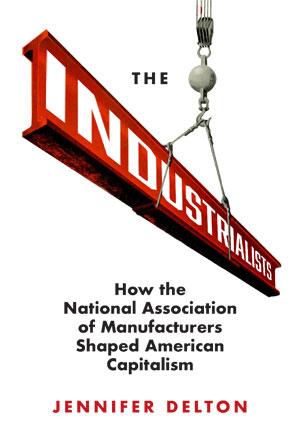
Manufacturing once drove the U.S. economy. Its factories and innovations defined American capitalism in the twentieth century. At its height in the 1950s, American-based manufacturing represented 25.8% of GDP and employed one in four American workers. When it declined in the 1980s, it took organized labor and the Democrats’ New Deal coalition down with it.
This book is a biography of “organized manufacturing” in the twentieth century, as represented by manufacturing’s main trade association and lobbyist, the National Association of Manufacturing, or NAM.
While historians and political scientists have written about NAM, they have done so from the perspective of its many enemies, namely labor, liberals, and environmentalists. What makes my approach unique is that I look at it from the perspective of manufacturing.
I ask, what did NAM do for manufacturing? How did it serve (or not) its members? What was its role in manufacturing’s rise? How did it contribute to its decline (in the U.S.) and how did it rework manufacturing in an age of finance and international supply chains?
In answering these questions, I end up telling a story about the rationalization and globalization of American industry, a story that touches on tariffs, trade expansion, labor, management, conservatives, liberals, lobbying, civil rights, immigration, mergers and acquisitions, automation, U.S. politics, and the rise of a finance-based economy.
Though nothing seems more boring than a trade association, I write about NAM as if it was a high-achieving dysfunctional family, riven by generations of divisions and conflicts between protectionists and globalists, small concerns and big corporations, liberal staff members and conservative leaders, with recurrent and public resignations, yet somehow maintaining itself as the singular “voice of industry.”
Historians and political scientists have long used NAM to represent “big business” or “industry.” In part, this was because NAM claimed to be the voice of organized industry and also because its archives have been some of the few available for business research. But there has never been a complete history about the organization itself from its founding in 1895 to the present (it is still a going concern). So filling in that gap is one “wider angle”— and the primary reason I took on this project.
Second, historians and political scientists have overwhelmingly focused on NAM’s conservative tendencies — its anti-union activity, its political lobbying, its opposition to the New Deal and government regulations, its relentless propaganda for “free markets” and capitalism. But because I am looking at the work NAM did to bolster and rationalize industry, I emphasize its more progressive tendencies, its work in standardization, workers’ compensation, and safety standards, its support for and development of affirmative action, its promotion of freer trade. Thus, despites its largely conservative Republican membership, it often supported liberal Democratic policies as represented by Woodrow Wilson, John F. Kennedy, and even Franklin D. Roosevelt. This should spur us to rethink how we understand liberalism and conservatism in U.S. history.
Relatedly, I try to historicize the slippery concept of “neoliberalism.” This politicized term is largely used by the left to critique the rise of global capitalism, especially under the leadership of Margaret Thatcher and Ronald Reagan in the 1980s. But recent scholarship has identified the neoliberal tendencies in earlier attempts to provide a global infrastructure for free trade beginning after World War I. See, for instance, Quinn Solobodian’s The Globalists: The End of Empire and the Birth of Neoliberalism (2018). In the U.S., the search for international cooperation and an integrated world market was pursued by progressive liberals in the Democratic Party, such as Wilson, FDR, JFK, and Bill Clinton. While critics see neoliberalism as conservative, I am interested in the way that liberal internationalist New Dealers and proponents of diversity (as opposed to protectionists, isolationists, and nativists) pursued these neoliberal policies in the U.S., arguably the most powerful influence in creating global capitalism. Here again, I think we need to rethink the overlap and confusion between liberalism and conservatism, especially around ideas of antiracism, diversity, and open borders. I think we need to account for the reasons that neoliberalism, a word that highlights liberalism, is seen in practice as conservative.
I would urge the reader to look at the Reagan chapter first. Contrary to conventional wisdom, I suggest the Reagan era was a low point for NAM. During the 1980s, deindustrialization and a hostile takeover wave decimated NAM’s membership and hence its influence. While Reagan advocated cutting taxes and regulations, policies favored by NAM, he offered nothing to help the U.S. manufacturing sector or small manufacturers, which were NAM’s bread and butter. Instead, Reagan’s policies benefited the rising service and finance sectors to the detriment of manufacturing.
But I would also recommend the chapter “A Changing Workforce,” which examines how NAM embraced and helped operationalize the civil rights legislation of the 1960-70s, including affirmative action. Was it in NAM’s interests to do so? Yes, absolutely, but does that make it any less notable?
I had the most fun writing about the epic battles between NAM’s ultra-conservatives and its slightly less conservative “moderates,” who saw the practical benefit to industry of accepting labor unions (while still curbing their power) and lowering tariffs. One of the more moderate influences in the organization was an executive secretary named Vada Horsch, one of the few female characters in the story. A fervent internationalist, her interests and influence on NAM in the 1940s and 1950s is evident in the archives and it was fun to give voice to NAM staff members, many of whom were women, since so much of the scholarship is focused on NAM leaders, who were overwhelmingly male heads of corporations.
Finally, take a look at chapter 12, which features interviews with former NAM president Jerry Jasinowski, whose 1990s-era NAM helped U.S. manufacturers and factory workers adjust to just-in-time production and international supply chains, thus reviving productivity and American manufacturing.
I was finishing up this book as Donald Trump won the Republican nomination and then the presidency, promising to restore American manufacturing—by reinstating tariffs and closing immigration. Over its 125-year existence, NAM had consistently favored lower tariffs, more liberal immigration policies, and the free and open exchange of goods and services. It had adjusted to the changes wrought by its own support for globalization. So Trump’s promises to reinstate a protectionist, nativist regime were hardly comforting, even though his focus on manufacturing was welcome. To the extent that President Trump is often seen as part of the backlash to globalization, this book could not be timelier, since the main narrative thread is about the globalization of U.S.-style capitalism.


Jennifer Delton, is Professor of History at Skidmore College. She holds a Ph.D. in History from Princeton University, and her work focuses on the political, racial, and economic history of the United States in the twentieth century. In addition to The Industrialists, which is featured in her Rorotoko interview, she is the author of Making Minnesota Liberal: Civil Rights and the Transformation of the Democratic Party (University of Minnesota Press, 2002), Racial Integration and Corporate America, 1940-1990 (Cambridge University Press, 2009), and Rethinking the 1950s: How Anticommunism and the Cold War Made America Liberal (Cambridge University Press, 2014).